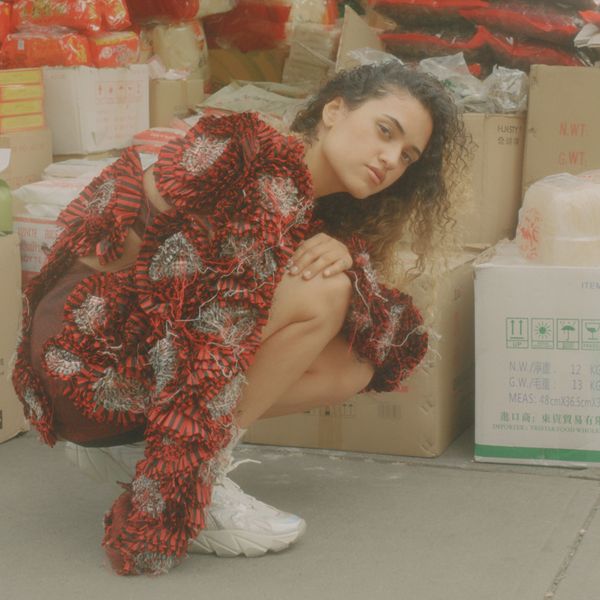
In Conversation: Empress Of and Perfume Genius
Story by Jael Goldfine / Photography by Natalia Mantini
Feb 01, 2019
Empress Of and Perfume Genius are the kind of collaboration that sets off instant explosions in the brain. For a certain kind of fan at least, just the sight of their names together conjures a vibrant, brightly colored fantasy, as the imagination gets to work on what the shivering, shackled restraint of Mike Hadreas' discography might sound like, unfastened by Lorely Rodriguez' ebullient, lighter-than-air melodies.
The vivid colors might just be my own brain, which has dyed Empress Of, the name and her music, the sunset yellow and maroon of her Us album cover — and Perfume Genius, the nude, pale pink and crimson hues found in the imagery for his last couple albums, No Shape and Too Bright. These aren't tones that blend all that obviously, however. The natural rapport of their sounds is obscured at first by their distinct affects. Empress Of often shrouds heartbreak with joyful, bold strokes of sound, while Perfume Genius, as he points out, sounds like he's going to cry at any moment.
This week the pair shared their first ever collaboration, billed as a Perfume Genius cover of Empress Of's "When I'm With Him," produced by Us-collaborator Jim-E Stack, and the blurry vision came into focus.
"When I'm With Him" is a trojan horse of a song. The title promises an index of all the wonderful ways a lover makes Rodriguez feel, but the story, hidden under the pretty synths and buoyant drums, hides a choking death rattle for a relationship, an underwater scream. Which is to say, it's an Empress Of song begging for a little bit of Perfume Genius.
However, the track is neither a Perfume Genius, nor an Empress Of song (unlike most covers, which are typically faithful to one contributor's style or the other). Instead, their colors form a new, sublime hue, a whole greater than the sum of its parts. Hadreas' cracking voice bleaches Rodriguez's poetry (the second verse, now sung in English), placing it under a spotlight that coaxes out their quiet agony. While Hadreas doesn't, as he jokes, turn it into a sad piano ballad, the woozy synths are stalled to a vibrato heartbeat that allows him to strike each word as only he can. But the melody's essential danceability is only softened, not erased. The chorus breaks through with big, juicy boom-clapping drums courtesy of Stack, and their duet is a reverie.
To get the story behind the track, PAPER got on the phone with Hadreas and Rodriguez to talk about what they love about each other's sounds, the term "pop," and fighting musical self-indulgence.
PAPER: Tell us how you got connected to create this song.
Lorely Rodriguez: I had never met Mike before we got in the studio together to work on the song. Right?
Mike Hadreas: Yeah. I'd seen you.
LR: Oh yeah, you saw me play, right?
MH: Yeah, I saw you play Arcosanti.
LR: Arcosanti, yeah. And I obviously knew about Mike's music and am a huge fan and really inspired by Mike. So yeah we hadn't met until we were in the studio together with Jim-E Stack, who is the silent investor in the track.
[laughter]
PAPER: Whose idea was the cover?
LR: Well I thought of it. I really, "When I'm With Him" is my favorite song on my album, Us. So I was talking with my label about things I could do, and you know, the word remix gets thrown around a lot. So I just thought about how much song means to me, and decided I wanted to do something that I had never done before. So I was like "well, what if we had an artist I love cover it." And I said Perfume Genius but I was like "ah that's never going to happen." Then it happened and––
MH: It did happen [laughs].
LR: I'm so happy.
MH: It happened.
LR: It happened!
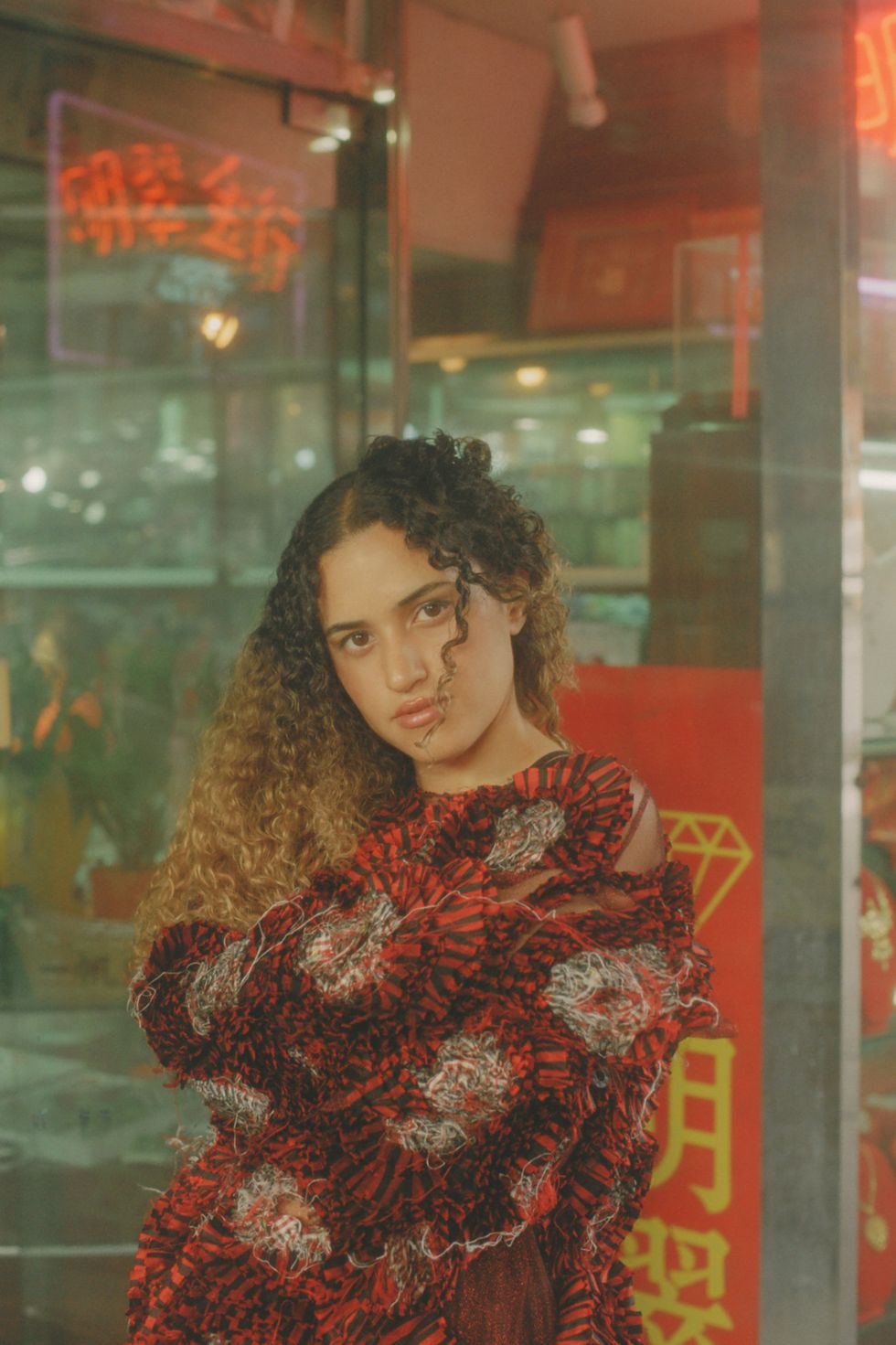
PAPER: Mike, what attracted you to this song?
MH: Well, I mean I had been a fan and I was excited to hear new music. I could tell within even listening to ten seconds of the song that I was... I mean I was bopping around.
[laughter]
MH: It's a classic, it really is like a classic bop. I had ideas after listening the first time. Even when I started to develop my version, I had many different roads that I was going down, that we could go down together… It was exciting. I think most people think, when they ask me to do a song, that I'm going to do a slow piano version, make it more sad, you know? [laughs]. I did go in singing that song that way, but I think it did lend itself to sort of slowing it down a little bit. And I can't help that no matter the way I sing something you know my voice breaks, just naturally even in conversation, you know? I sound like I'm going to cry when I'm even talking sometimes [laughs].
LR: Which is not how you were in the studio though! You're like full of joy.
MH: I don't know what happens! It's just the minute I start singing I'm like "oh no." That seems heavy, but I like that, that's just my taste too for listening and stuff. You know, I like joy but for some reason whenever I sit down to make music, it's not the driving force.
LR: It doesn't help––
MH: And ["When I'm With Him"] just has this melancholy to it, but it's warm, at the same time. It's like Robyn. Robyn's songs can be about heartbreak or something really hard, but there's still this sort of joy inside of it. Or hope I guess.
LR: Yeah, I mean I wrote a break-up song. But it's a healing break-up song. So it doesn't, you know, the occasion is for being heartbroken. I think one of the most fascinating to me as an artist, is writing a song with my feelings, with my experiences. They're my words. But the moment Mike started singing those words, he interpreted them with his whole experience. We don't sing the lyrics the same, emoting it. So that was the most fascinating things to me. As soon as he started singing it, he made it his own song and I was like, as the person who wrote the song, "oh woah." That's the coolest thing to me, that I didn't know I would experience. Having another artist interpret your song is a crazy feeling.
PAPER: You've both covered a lot of other artists.
LR: Well, I think, with the covers that I've done, like I've never met Lana Del Rey. Like I know the song "Love" by Lana Del Rey so well and I was like "okay I'm going to make a really dance-y version of it." But being in the room with Mike and talking about, you know he talked about these roads, and like all the ideas that came to him when he heard the song about how he could interpret it. Yeah to me, that's like next level covering or re-working or interpreting.
MH: We did it together, you know, which is very different. It's usually very solitary thing where I've just listened to a song over and over, and then on my own I make this version kind of for me and it fits everybody else. This was sort of, you know, maybe, it started with my initial way of singing, but then we all sort of filled something around it together.
LR: I love those big drums in the chorus.
MH: Hell yeah.
LR: It's cool to hear your voice with like Jimmy's big drums. I just love... I was listening to your album again, No Shape, and I just really love the loud moments. It's really cool to hear your voice, and the timbre of your voice. You know how, you talk about your voice breaks naturally when you sing — that's one of my favorite things about your music, that balance of your voice breaking over, like the intimacy of your voice breaking over these crazy ass drums. So I'm really happy that we got to have a moment like that in our song.
MH: Well it's selfishly too, I always wanted to bring that gated drum energy to a song, which never made sense in any of my songs so far, or it would take it too far. It didn't fit but they were perfect there, and this is really satisfying to hear.
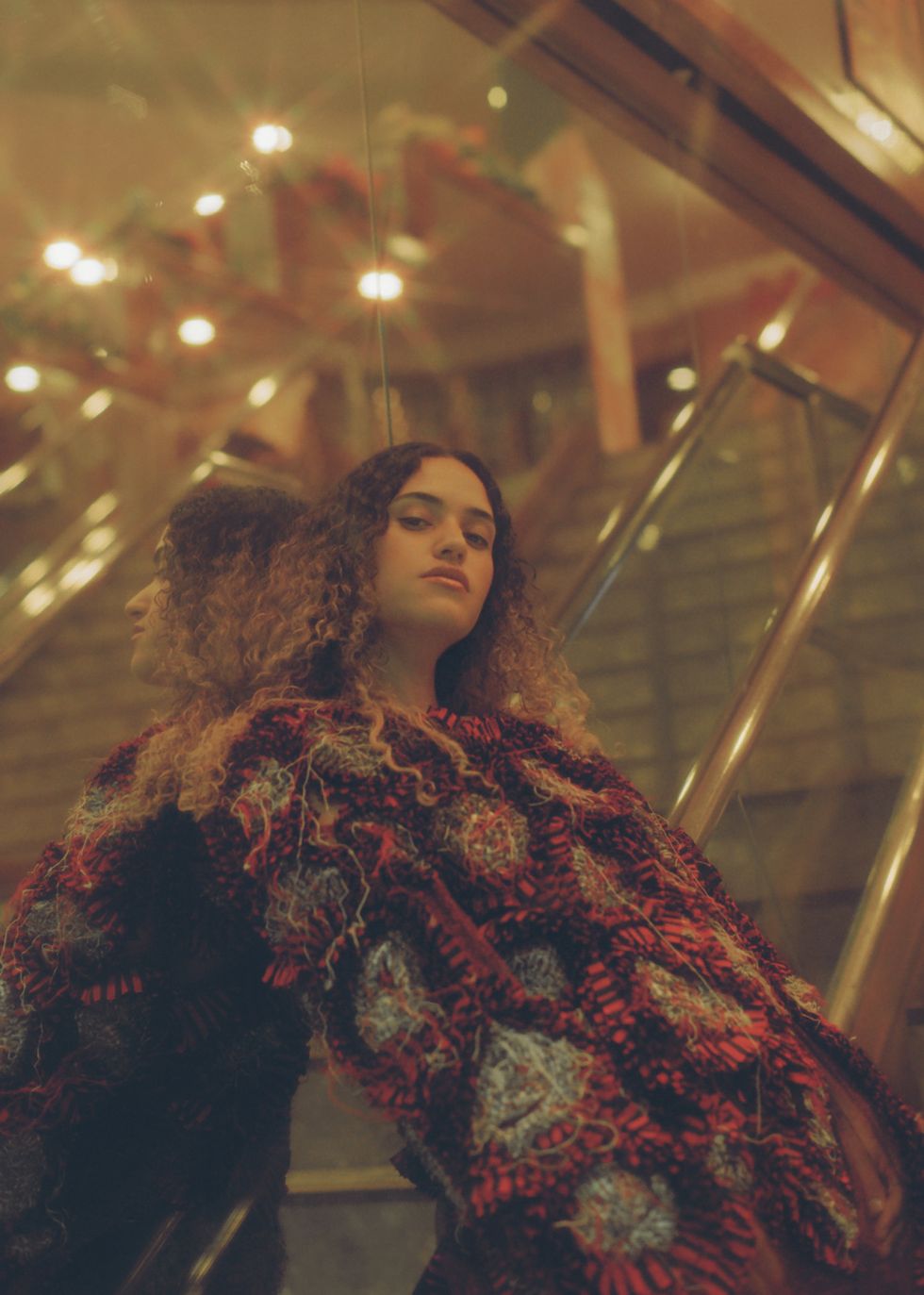
Photography: Natalia Mantini for PAPER
PAPER: It's kind of the perfect synthesis, regarding affect. Lorely, a lot of your music is really sad, or about pain, but has an upbeat affect, whereas Mike, your music sounds sad even when it's happy.
LR: Yeah, definitely. I think Robyn, Mike, when you talked about Robyn, I really relate to that. She's a master of making these songs that are, if you just read the lyrics by themselves, you'd be like, "Oh damn. There's some crazy shit going on." But then you hear the beat, and it's like, "I'm celebrating something that's hard in my life." It's like taking something that would be sad, but giving it a twist. I don't know, but yeah I love Robyn.
MH: Yeah, then the song ends up being for you, not for them. It's for you, and then it translates to the person listening to it, for them. It's not for the experience, it's not for the sadness or whatever's after.
LR: Mhm. I love that.
PAPER: I saw some listicle recently that was like 2018 was the "year of the sad banger" or the "dancefloor crier." So it's definitely a ripe time for it.
[laughter]
MH: Ripe? I hope the song is ripe [laughs].
LR: The ripe time. I love that, it's the ripe time.
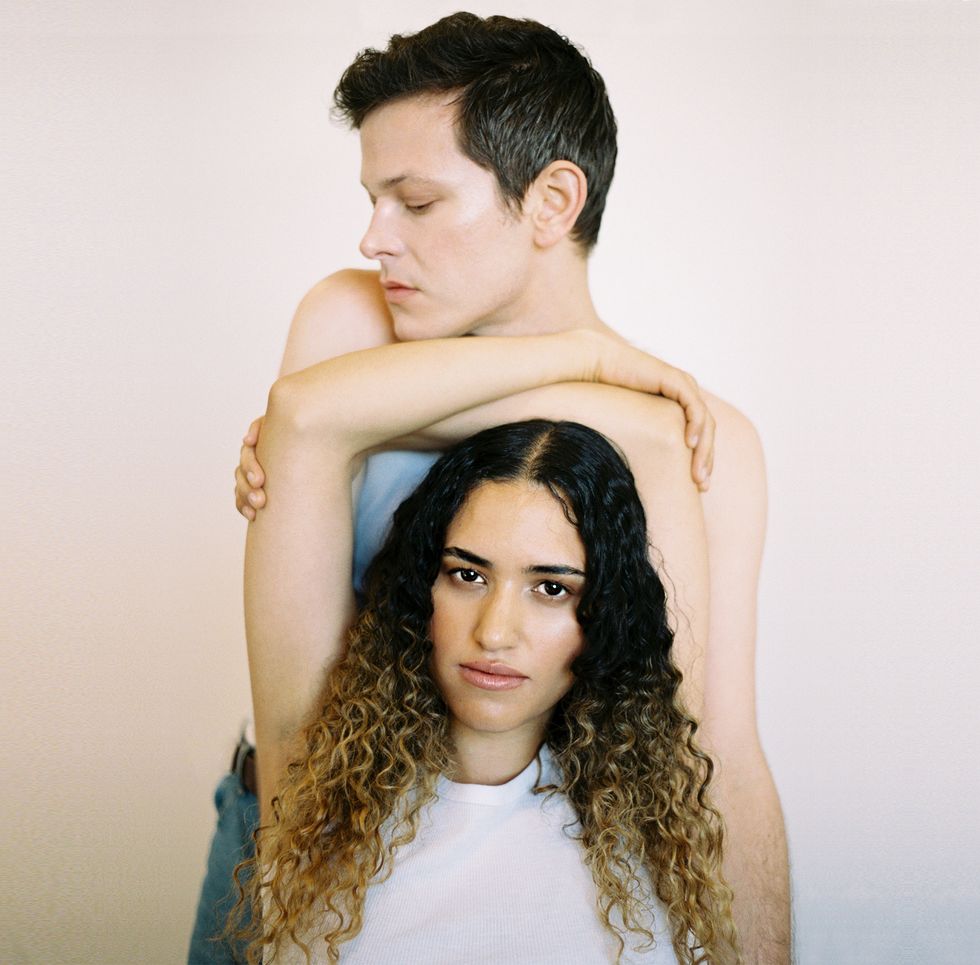
Photo: Quinn Wilson
PAPER: It's definitely a ripe time for sad bangers. So, I'd love to know what attracts you to each other music, or how you think your music intersects.
MH: What I like about a lot of your songs is how strange the melodies are. So like, every satisfying. I guess my favorite thing in music is when things can be warm and sort of familiar, but still really surprising and fresh. All that has to combine into something that's still satisfying because people can go too far and need that direction, I like how weirdly, perfectly balanced a lot of your songs are.
LR: I feel like you're very similar in that way. Maybe you use different textures for your production, but I feel like I could listen to a Perfume Genius song and so many parts of it feel familiar, but it's like an alternate universe, of how you would expect that song to sound. It's very much your own sound. But it's still, I could like… It's a bop! A bop.
MH: A ripe bop.
LR: A ripe bop! Oh my god. Yeah, no but I definitely feel like you're similar in that way, where it's like, you know, you're taking the tools and you're writing pop melodies, but in your own twisted ear.
"I could listen to a Perfume Genius song and so many parts of it feel familiar, but it's.... an alternate universe"
MH: Well, I mean I really weird batch of influences. I kind of like, I just like everything. And I get obsessive about certain times and certain things, they're kind of all over the place. We haven't really ever talked a lot about this, but I can kind of feel the same thing from you.
LR: Mmmmm, yeah. I feel like when you like so much different music, it comes out in your music. Like I I listen to pop music, but I listen to classical music. I don't know, I don't want to get too into genres and artists, but...
MH: I know, yeah I was trying to figure out a way to talk about it without doing that. [laughs]
LR: Because then it's like, "now we're here talking about, 'Oh This is my favorite artist from the 80's!'" Yeah, but that's definitely been a big part about me, is like, I love the divas and the pop stars, but I also grew up listening to jazz and classical music and so it definitely influences my music, which as you said is similar to you.
MH: I think I love the pop music when you can hear, underneath, no matter the melody, or how weird someone is. I don't know, there's a weird charisma that comes through no matter what the song is, and I think your music has that, and I at least try to bring that same thing, but no matter what I do, the essence is still kind of strange and comes through no matter how the song ends up sounding.
LR: Mhmm.
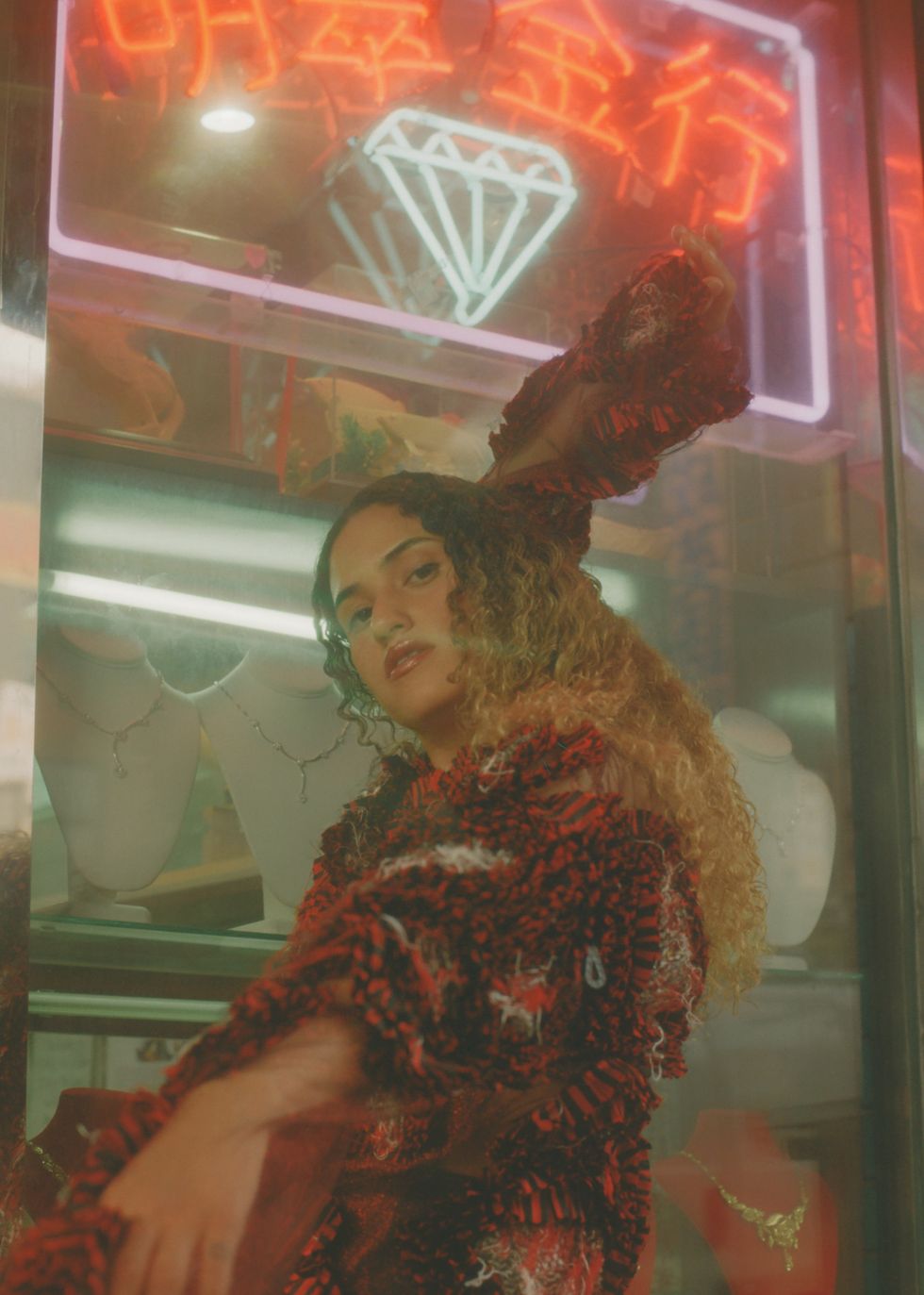
Photography: Natalia Mantini for PAPER
PAPER: You're both artists who've been called pop artists. The term both obviously seems to fit you both and equally obviously, feels reductive.
LR: I don't know. Mike, how do you feel about people calling your music pop? I mean, do people call your music pop?
MH: Yeah. I think they do. I mean, I consider a lot of things to be pop. I consider a lot of the music I like to be pop. Like I think Björk makes pop.
LR: Oh yeah.
MH: You know what I mean? But that's what I want. Most of the experimental, or like what I would consider experimental pop — I mean it's not too far down there — but I still, I need things to be catchy, I need things to be melodically satisfying, I guess in a pop way. I don't know if I think about pop in the same way as the people writing about it do, but that's how I kind of think about it, that it's for the person listening to it. I think some music is for the person that wrote it, or kind of to be studied or appreciated. But not that full-bodied enjoyment of it, and I think that's what pop music does. It's like some weird equation with the melody, where you get that pop feeling. I think that that can translate into a lot of different weird things. It doesn't have to be filtered to something that can be massively appealing or that could go on the radio, if the radio is still around.
[laughter]
LR: Yeah, my experience with pop has always been, that it's such a general word. It's supposed to mean that a lot of people like it. I think if people say that my music is pop, then I'm contributing to changing what pop music sounds like, which is dope. Because I think my music is a little left, a little weird. So if people throw the word pop around, I'm like, "Yeah, okay. Call my music pop, because I don't think it's pop." In the same way that we would think Björk is pop, or I don't know. I'm just like "let's reshape that word, what people think is pop music."
"Let's reshape that word, what people think is pop music."
PAPER: Do you write music for others or for yourselves?
MH: Well when I started it out, when I didn't think anybody would hear it, it was still just therapy for me. Then I shared it with a few friends and it kind of changed how I wrote a little bit, but after my first record came out, I brought all the people that liked it with me when I was writing.
I mean and that's important too, you can't bring everyone, or I don't like to bring everyone [laughs]. But at least the people who responded to it and were feeling the first album, I felt like I wanted to bring them in. I've listened to bands and people for a long time, where I can tell that they're making music just for themselves.
LR: Mmmmmmmm.
MH: I never want to do that. Just even on a selfish, technical level, I think the music is worse [laughs]. It's always going to be indulgent, it's indulgent of me to be even singing, like "Hey, check this out." It's indulgent just to make something. But I guess I get obsessive about making sure that I'm never being noodle-y or jammy with my feelings or what I'm talking about or just writing something just to be impressive... to impress myself or impress other people. I want to bring them something that's going to be more of a guide to people, and not just something, where it's just about me being witnessed. Hopefully witnessed. That's a lot of weird babble, but…
"I get obsessive about making sure that I'm never... writing something just to be impressive."
LR: [laughs]
MH: "I want my music to be a guide" [laughs].
LR: I really connect with the word therapeutic. That was a huge reason why I started making music in the first place. I think the more you make music, well, at least for me, I know the things I experience and that other people experience, so I know that people will connect with it in that way, but I'm not like, "Oh! They really like that one number I put out, let's duplicate it!" I would never make music, like pop music, where I'm making it just for the listener, but I do want people to connect and share the same experiences that I have.
MH: What was weird, that I learned after the first record was that, the more personal it was, weirdly there's less of a barrier for people to connect to it. When you make something that you're trying to make a lot of people connect to, it usually falls flat. When I say, "Bringing people in with me," I want to make sure my language isn't excluding, that it's not a blanket, that I'm not writing some kind of fable.
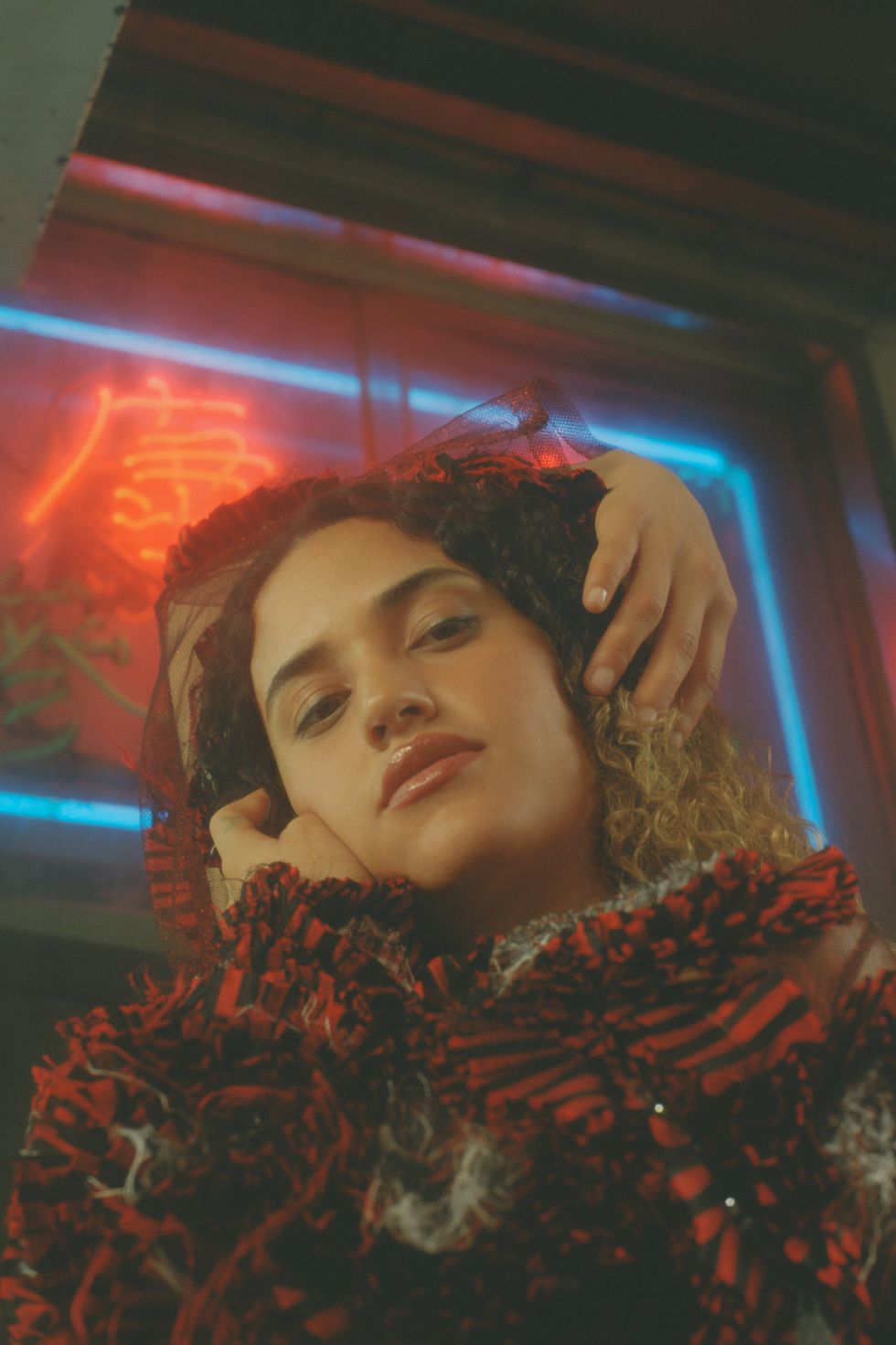
Photography: Natalia Mantini for PAPER
PAPER: I'm curious what it was like for you, Mike, to sing in Spanish.
MH: Well I don't speak Spanish, so it was important to me that, if I was going to sing in Spanish, it was correct. [laughs]
LR: Yeah, of course [laughs]. Yeah, we actually, in the studio, so the second verse is in Spanish. And we translated the second verse into English, which to me is so cool, because I only know the song in Spanish. I wanted to find that balance where like, Mike is making the song his own, but also collaborating with an artist who sings in Spanish, and you killed it. You sound great. I've worked with other artists where we've done that, like Khalid. He speaks a little bit of Spanish, but like, we wrote the song together for his EP Suncity, which was in Spanish. I think the world is becoming more global, and artists want to sing in different languages and collaborate with different artists that speak different languages, like Rosalía and James Blake. It happens in pop music so much right now. It's not such a rare thing, which is awesome to me, that it's becoming normalized.
PAPER: There's so much Spanish language music, not just on the pop charts, but also on Pitchfork.
LR: Yeah, and it's all from what you would call indie, to pop music, everyone is just embracing how little understanding the language matters in songs. Because at the end of the day if you feel a song — like I listened to Christine and the Queens sing in French, and I don't know what she's saying, but I really connect with it, because it's a feeling.
MH: Yeah, I usually prefer the French version of her songs because I don't know what's going on, but you can feel it.
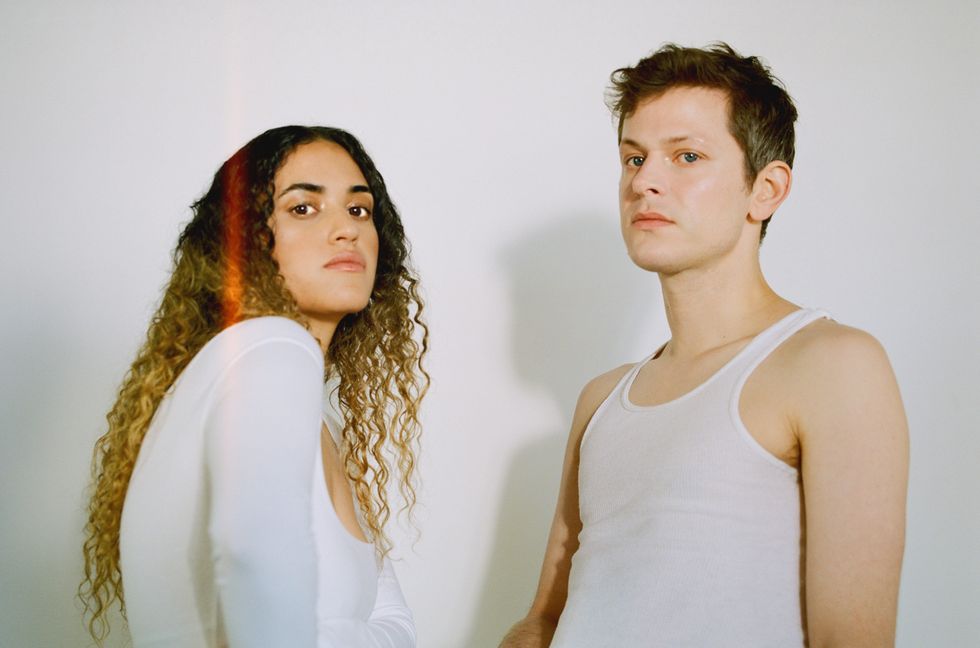
Photography: Quinn Wilson
PAPER: I wonder if you could talk a little about your experiences as artist consumed within identity categories like queer, or Latina.
LR: I would just say for me, I get put into a lot of... it's a lot about media trends, and what people want to talk about. When I first started making music — I've always been singing in Spanish as Empress Of, I've always been a woman producing my own music. When I first started making music, it was like, "Female producer!" and that word was thrown around a lot. Then it became like, "eye roll." A lot of people started being like, "Can you just say producer? We're tired of that." Then that became unpopular, and now it's popular to be like "Latinx artist! Bilingual." I think it's just trends mostly. Honestly, the most important thing to me is representation and inspiring other people like myself to do things that they think they can't do — because they don't see people like themselves doing it.
MH: Yeah, I get a little resentful because I'm just making stuff and I'm gay. I guess, by nature, the music is gay because I am. But in the beginning, it wasn't a political thing, I was just making things. But at the same time, it's important to me. And I'm really proud of it, that a lot of my songs really are in-your-face, like, "fuck you," about the way I've been talked about or been dealt with, how I think about myself. It's a weird feeling because it's just part of me, but at the same time it's important. It's a strange balance, and sometimes people can talk about it in a way that's balanced, and sometimes people are just lazy when they talk about, and it's just kind of fucked up, whether they know it or not.
PAPER: Yeah it feels like we've reached an impasse, a point it's more powerful or radical to resist feeding the media trends around identity politics, despite wanting to champion or be proud of an identity.
MH: Yeah, it is very much about trends. I remember when I released my third record, everybody was asking, "Why are you talking about homophobia? Why are you bringing these things up because things are getting so much better?" The climate was better then, for people to be like, "We're all okay, everything's fine." Then with my new record came out, that's a little more personal, and less overtly political, everyone was asking, "Why isn't it more political? Why aren't you talking about these things as much?" It's obnoxious.
PAPER: Mike, you're about ten years older than Lorely. Do you have any advice for a younger artist?
LR: [laughs] I think... I don't know, I don't think it matters, for me.
MH: I mean, it matters a little bit. But it also doesn't matter [laughs]. I mean, when we did the photoshoot, it looked like a family portrait, we wanted to bring some kind of like family energy to it. And I definitely, I don't know if I was the mom, but I wanted to be the mom, so I don't mind the age question.
LR: Well we were like, the reference photos were very, like, we wanted Perfume Genius to be maternal, in the posing. I love it!
Perfume Genius and Empress of Photography: Quinn Wilson
Empress Of Photography: Natalia Mantini for PAPER
Empress Of Styling: Turner
Empress Of Photos: Top by Queenie Cao, Shoes by Ash
From Your Site Articles
- 10 Songs by Perfume Genius, Amnesia Scanner, Moses Sumney - PAPER ›
- Perfume Genius on New Album, "Set Me on Fire Immediately" - PAPER ›
- Perfume Genius and Boy Harsher Believe in Sexy Ghosts - PAPER ›
- New Music Friday: Empress Of Releases "Save Me" EP ›
- Perfume Genius Releases Initial Talk "On The Floor" Remix ›
- Blood Orange's "Hope" Video Stars Diddy, A$AP Rocky, Empress Of ›
- New Songs by Empress Of, Tyla, Real Estage ›
- Perfume Genius Releases "It's A Mirror" Off "Glory" - PAPER Magazine ›
- Perfume Genius and Aldous Harding Share "No Front Teeth" - PAPER Magazine ›
MORE ON PAPER
ATF Story
Madison Beer, Her Way
Photography by Davis Bates / Story by Alaska Riley
Photography by Davis Bates / Story by Alaska Riley
16 January
Entertainment
Cynthia Erivo in Full Bloom
Photography by David LaChapelle / Story by Joan Summers / Styling by Jason Bolden / Makeup by Joanna Simkim / Nails by Shea Osei
Photography by David LaChapelle / Story by Joan Summers / Styling by Jason Bolden / Makeup by Joanna Simkim / Nails by Shea Osei
01 December
Entertainment
Rami Malek Is Certifiably Unserious
Story by Joan Summers / Photography by Adam Powell
Story by Joan Summers / Photography by Adam Powell
14 November
Music
Janelle Monáe, HalloQueen
Story by Ivan Guzman / Photography by Pol Kurucz/ Styling by Alexandra Mandelkorn/ Hair by Nikki Nelms/ Makeup by Sasha Glasser/ Nails by Juan Alvear/ Set design by Krystall Schott
Story by Ivan Guzman / Photography by Pol Kurucz/ Styling by Alexandra Mandelkorn/ Hair by Nikki Nelms/ Makeup by Sasha Glasser/ Nails by Juan Alvear/ Set design by Krystall Schott
27 October
Music
You Don’t Move Cardi B
Story by Erica Campbell / Photography by Jora Frantzis / Styling by Kollin Carter/ Hair by Tokyo Stylez/ Makeup by Erika LaPearl/ Nails by Coca Nguyen/ Set design by Allegra Peyton
Story by Erica Campbell / Photography by Jora Frantzis / Styling by Kollin Carter/ Hair by Tokyo Stylez/ Makeup by Erika LaPearl/ Nails by Coca Nguyen/ Set design by Allegra Peyton
14 October




